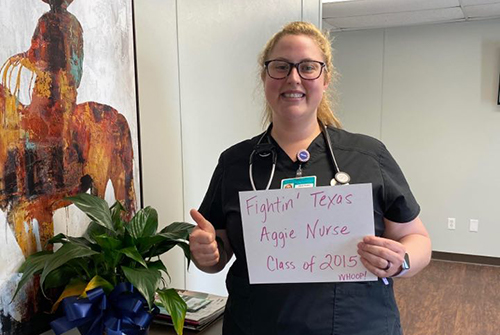 Alexis Cooper Turner ’12 – Nurse Practitioner, Blessing, TX
Alexis Cooper Turner ’12 – Nurse Practitioner, Blessing, TX
"When COVID-19 hit our county, the environment at our clinic became intense, which is not normal for our rural walk-in clinic. However, we all came together and worked diligently to do our best for the community and continue to do that day-in and day-out. I was called to work a drive-thru to screen and test people for the virus. As we continue to navigate this pandemic, I have been reflecting on three words: patience, understanding and caution. This is something our generation has never been exposed to, whereas some of our elders have lived through the Spanish Flu or Great Depression. We’ve had to practice caution in a different manner. People have had to learn that this is something we don’t understand and are learning about daily. So, in order to learn and develop new policies and procedures, people have had to be more patient."
CHASE HARRIS ’17 – REGISTERED NURSE, FORT 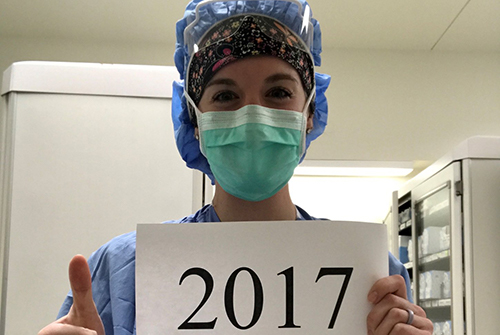 WORTH, TX
WORTH, TX
"Nothing has changed and yet everything has changed. You always hear that nurses are in demand, so it came as a bit of a surprise when our staff was told our hours had been cut due to COVID-19. It's crazy to think in the middle of a health care crisis, nurses weren't allowed to work. Fortunately, elective surgery has slowly been allowed to come back. However, our whole process of how we do surgery has drastically changed. Young adults are coming in for surgery for the first time and patients with life-altering diagnoses are coming with no one to accompany them due to adjusted visitor policies. Nurses are truly having to be family for our patients now more than ever. We are beyond grateful for the praise and recognition health care workers are receiving during this time. However, this is what we signed up for. We go to work knowing full and well what we may possibly be exposed to every day. And that's a risk we are always willing to face for our patients.
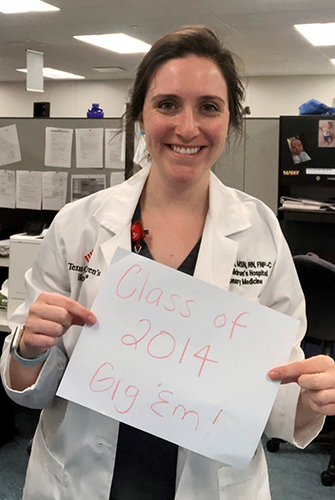 It has been hectic, but this time has truly created a strong sense of morality in the health care community. There is now a sense of Aggie-like camaraderie throughout health care. We've truly had to rely on an interprofessional approach to care to fight this virus. This is how we should be approaching health care every day, banning together to always put the safety of our patients first."
It has been hectic, but this time has truly created a strong sense of morality in the health care community. There is now a sense of Aggie-like camaraderie throughout health care. We've truly had to rely on an interprofessional approach to care to fight this virus. This is how we should be approaching health care every day, banning together to always put the safety of our patients first."
ELISE WHALEN ’14 – NURSE PRACTITIONER, HOUSTON, TX
"As I reflect on the last several months, February 2020 seems like such a lifetime ago. The lessons that we have learned from this pandemic are immeasurable in so many ways, and I think we will continue to reflect on this time for many years to come. As a nurse and nurse practitioner, I have been so inspired by the work of my fellow nursing partners, especially those serving on the frontlines caring for patients in COVID-19 units.
I care for children who are considered higher risk for complications should they become ill with any type of respiratory virus. When the pandemic initially started, we tried to defer bringing patients in for outpatient clinic visits to reduce their risk of getting sick, unless their visits could not be postponed. Our recommendations to them were like those during the cold and flu season, which include excellent hand hygiene and avoiding sick persons and large crowds. For the most part, we advised families to stay home and limit their exposure as best as possible. So many things have changed that have made us better providers and care givers. Everything is not always the best, but we make the best of it."
DR. GORDON MITCHELL ’77 – CARDIOLOGIST, COLLEGE 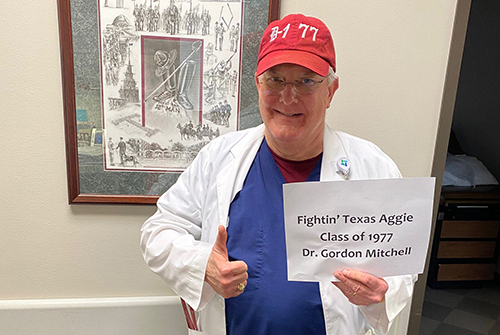 STATION, TX
STATION, TX
"As a cardiologist, I do not directly deal with many COVID-19 patients. However, we have tried to minimize patients coming into the office by using telemedicine. Before the pandemic, we always treated patients as individuals, but we also followed specific policies, procedures, protocols, guidelines and best practices. Now, all those things are changing daily, and we are adjusting what we do daily. This is something we have never seen before. It is difficult using telemedicine in a cardiology practice. Not having an EKG or being able to listen to a patient’s heart and lungs has provided its own set of challenges, but this allows people to stay home safe. In addition to adopting telemedicine, there is now a screening process upon entering the hospital. Never in my 34 years in cardiology did I ever contemplate having to hold appointments online during a pandemic, but this is what I signed up for as a health care worker."
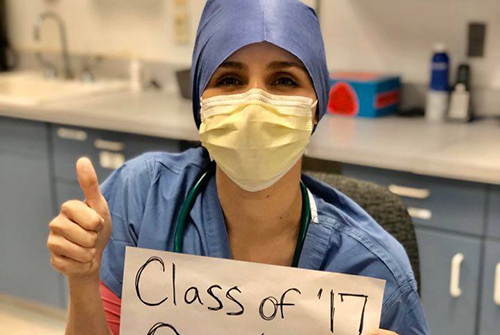 HALEY WILLIAMS ’17 – CARDIOTHORACIC ICU NURSE, COLLEGE STATION, TX
HALEY WILLIAMS ’17 – CARDIOTHORACIC ICU NURSE, COLLEGE STATION, TX
"Challenging. Gut wrenching. Frustrating. Just a few words that come to mind when reflecting over the new “normal” that has been created as a result of COVID-19. Our everyday routines have been upended, at home and work. As this situation continues to evolve, my fellow nurses and I have remained flexible and kept our own fears and emotions in check in order to do our jobs. For me, there is an odd reassurance I have gained from working in the hospital, because I feel like seeing it helps to understand what is happening a little better.
When this pandemic first hit, it was very scary. I went through a variety of emotions. As a health care worker, I was scared that we didn’t have enough supplies, we didn’t have reliable testing, and I did not feel adequately protected as a nurse. I was also stressed about my own personal life, just as the entire world was. (“I can’t go see my parents,” “When will I see my sister again?”, “Is it safe to get food,” etc... These are things I was constantly asking myself.) I was sad because my sick patients were completely alone—no family at all could visit, even if the patient did not have COVID-19. This is probably what affected me the most and largely still does."
DR. JUSTIN MARKLEY ’10– COMMISSIONED CORPS OF UNITED STATES 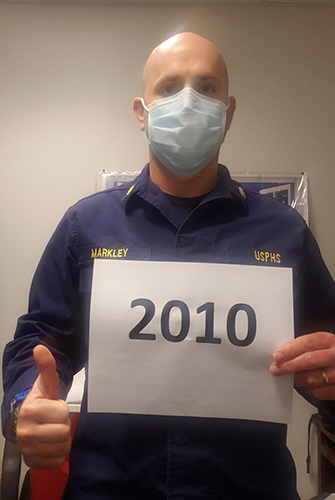 PUBLIC HEALTH, BLOOMFIELD, NM
PUBLIC HEALTH, BLOOMFIELD, NM
"My duty station is an Indian Health Service (IHS) ambulatory care clinic called Dzilth-Na-O-Dith-Hle Health Center. Most of my time is spent as a clinical pharmacist. Navigating this unprecedented situation has been stressful. As the incident commander at our facility, I have been very involved in planning and implementing changes to our patient flow and safeguards for our staff. We activated our incident command team in early March and almost immediately made changes to patient flow throughout our clinic.
From an emergency response perspective, the challenges have been endless. As we started implementing changes to our patient flow, we saw a lot of concern among our staff. While it may be cliché, at every turn I have been reminded about how important it is to have good communication. The overall mission in our response has been to continue providing quality care to our patients while providing a safe environment for our staff. I have learned that being more intentional about how I communicate with others can go a long way toward achieving our goals and lowering stress levels as we get there."
KYLE FISCHER ’20 – 4TH YEAR PHARMACY STUDENT, COLLEGE STATION, TX (shown on right)
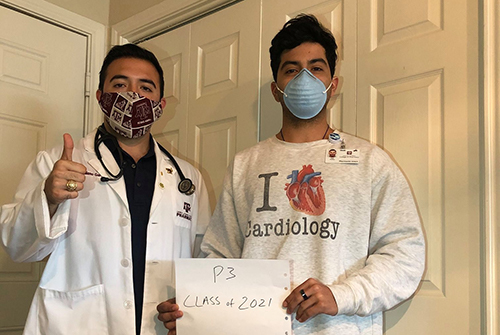 "Serving in health care the past few months has been a constant battle to defeat COVID-19 and maintain morale in the community. Seeing the camaraderie that has arisen in the health care field and the bravery of those serving day-in and day-out to make sure their patients are receiving the best quality of care has shown me that together we will overcome this pandemic.
"Serving in health care the past few months has been a constant battle to defeat COVID-19 and maintain morale in the community. Seeing the camaraderie that has arisen in the health care field and the bravery of those serving day-in and day-out to make sure their patients are receiving the best quality of care has shown me that together we will overcome this pandemic.
I think one key takeaway to note is that while we don’t always control what happens, we do always control how we respond. With the situation at hand, I’m always searching for a way to try and see how we could use this time to get better, to grow and to be of service. Pharmacists and their teams are a vital health care provider during the outbreak. They remain on the frontline of public health serving their patients. No matter what profession or field you are in, we can all be of service in one way, shape or form, and I think during the COVID-19 pandemic, putting forth our best efforts in order to serve, love, care and help those around us goes a long way. I have seen the difference it can make."
MASON HATCH ’17 – ADULT ICU/FLOAT POOL NURSE, BRYAN, TX
"Not all superheroes wear capes. Some wear scrubs. In this challenging time with 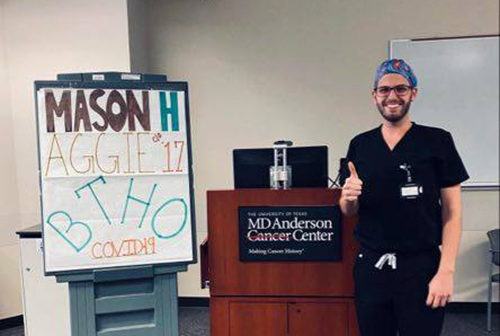 COVID-19, people are having to learn and adapt to constant changes and challenges they never knew were coming. Nurses, however, do this daily. Every day is a new day, with new challenges, and new knowledge and skills required to complete these challenges. Nurses sacrifice so much of themselves to selflessly treat and care for our patients. Words cannot describe the unique experience each nurse encounters day to day, shift to shift, and patient to patient. We are nurses, and we will always be there when we are called upon.
COVID-19, people are having to learn and adapt to constant changes and challenges they never knew were coming. Nurses, however, do this daily. Every day is a new day, with new challenges, and new knowledge and skills required to complete these challenges. Nurses sacrifice so much of themselves to selflessly treat and care for our patients. Words cannot describe the unique experience each nurse encounters day to day, shift to shift, and patient to patient. We are nurses, and we will always be there when we are called upon.
The most challenging part of working with COVID-19 positive patients and other patients has been seeing how isolating it can feel to them during this time. With social distancing precautions to protect ourselves and the patients, most of them do not have visitors. Take being physically isolated from your loved ones, along with the fear of the unknown that the COVID-19 virus presents and combine that with the already overwhelming challenge of fighting for your life every moment of every day from cancer; these patients are scared. As nurses, this is one of the biggest challenges we face."
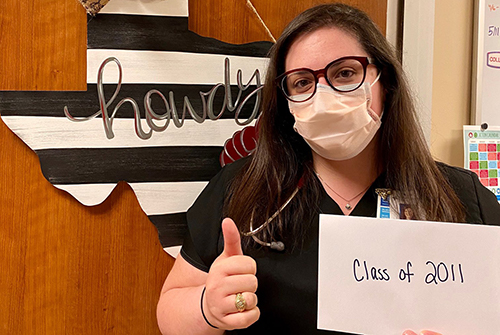 PORSCHA BUCK ’11 – PHYSICIAN ASSISTANT, COLLEGE STATION, TX
PORSCHA BUCK ’11 – PHYSICIAN ASSISTANT, COLLEGE STATION, TX
"The unknown can be intimidating and even frightening. With any virus, there is initially a great deal of unknown. I am fortunate to work for an institution that strives for innovation, especially when caring for patients. A few years ago, my department began seeing select patients via telemedicine for follow-up appointments. Therefore, we had an easier transition into this form of visit prior to and during the shelter-in-place. In endocrinology, I have the privilege to care for patients with a variety of conditions. Unfortunately, these conditions can have negative effects on the immune system either because of the disease itself or the medication used to treat the disease (e.g. diabetes, certain osteoporosis medications, etc.).
The biggest lesson I will take away once the pandemic has ended is a reinforcement in the idea that you plan for the worst and hope (or rather strive) for the best. We cannot plan for every pandemic or negative situation in our life. However, we can do our best to plan and prepare for the challenges that life will bring. Most importantly, we do this together. That is what the 12th Man is all about— standing long, standing strong and standing together."
DR. VALERIE GUERRA ’18 – PHARMACIST, WESLACO, TX AND SAN 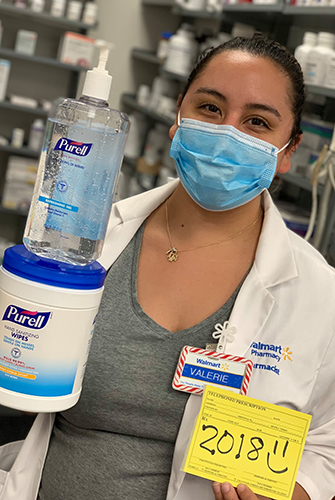 BENITO, TX
BENITO, TX
"Everyday life in a retail pharmacy is fast paced, but when the COVID-19 pandemic hit, every store and every pharmacy went into overdrive. I split my time between two Walmart stores, and the increased demand for medication refills coupled with adapting to life in the new normal was challenging. We implemented new services like curbside pickup and mail order for patients to get their medications and minimize contact with others. We installed plexi-glass barriers across every window and took extra precautions cleaning and sanitizing. Pharmacists everywhere are trying their hardest to keep up with the new laws, policies, procedures, and above all, keeping everyone safe. When face masks were in high demand and of short supply, my fellow pharmacy associates and I began making masks at home to give to our patients. We targeted patients who had the greatest risk first and tried to help as many people as we could.
I never imagined that we would have to wear a facemask in public or that stores would be limiting the number of customers. I also never imagined that we would ever have a food shortage or toilet paper shortage, yet all of these things happened in what seemed like the blink of an eye. While we may be used to life going a certain way, nothing is guaranteed tomorrow. If nothing else, that is what this experience has implanted in me. Consequently, I will always remember to hug my family a little tighter, root for the Aggies a little louder, and always order dessert at restaurants, because you never know when it’ll be your last."